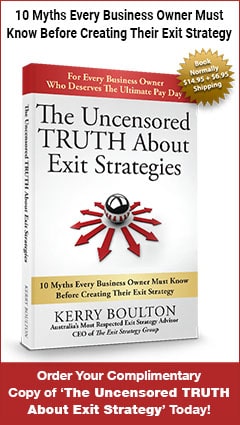Business Blueprint Interview: How to Successfully Sell Your Business for the Best Possible Price
How I Got My Start in Business
I was sixteen years old when I started in the workforce as a secretary. I was self-educated pretty much alongside the best people I could possibly find to learn from. And finally, one day an opportunity presented itself for me to have my own business. I was then about 20 years down the track, but I had been through a number of different industries.
I had risen to a level in a corporate, which was Mayne Nickless Limited, and I was the first female general manager in that organisation. I ran an international freight forwarding business. When they decided they wanted to be out of the business, I put up my hand and said, “I would like to buy the business.” And so, that was the beginning of the first of my businesses.
How I funded that business is actually a really interesting story, especially when you look back. The business plans you write when you are in a corporate organisation are not the business plans you have to write to actually go out and find investors.
I learned from a book back then called “How to Write Plans that Win $$$,” which had just been released. It was written by Stanley Rich and David Gumpert from MIT, Massachusetts Institute of Technology.
I got hold of the book. I read the book from cover to cover in 24 hours and I wrote my plan exactly by the book, because I did have to get investors.
I went to a mentor, which of course is another really important person to have in your life. I went to a mentor who said to me, “Kerry, you write the plan. If you can convince me, I’ll help you to get the money together.” And that’s exactly what he did.
I instantly had sixty-three staff, five offices around Australia and 120 international agents. And I gave birth to my first child the day I had to sign the contract, which women will appreciate, of course.
The first couple of years were incredible, we went through every possible upheaval you could imagine. This was 1987, Black Friday, world stock markets crashed and we had tragedy. Unfortunately, one of my state managers was killed in a car accident. We had rampant interest rates up around 18, 19, 20%, in terms of finance costs. It was enormous. We had a rollercoaster ride basically, up and down, up and down.
The beginning and the end of my business plan worked out exactly as I’d planned, which was my first experience of having to have an exit strategy.
One of the things I learned was, particularly if you have investors, is they have to know how to get their money out of the business. So part of my thinking when I was going to buy the business was how were we going to exit? The plan was to sell it off to an international group somewhere between the five- and ten-year mark. And that’s what happened.
Along the way, it was really a rollercoaster like every other business. We won a small business award. We went through the Telstra small business awards and won. We went through the whole quality movement, continuous improvement, which was outstanding. I would still highly recommend that discipline—the systems and processes we talk about today—understanding what continuous improvement is all about.
That sounds like corporate-speak, with cross-functional teams. But of course, people in five states around Australia, all having to work together plus your overseas agents, everyone has to work together.
By implementing those documented systems and processes, we found profit leakages; costs that we were incurring that we got rid of. We really turned the business around. I think in one year we had about at $1.5-million turnaround, which was amazing.
I sold that business nine years later. I would say there were a lot of learning experiences in that process. We were happy in the end. That wasn’t multimillions. I would love to say that it was but we got our money. We got our return on our investment and it gave us cash flow over the nine years.
The most important part of that change-over, really, was that everyone had a job. That was the most important part for me.
After that we started a real estate business and ran it for 11 years, from ’96 to 2007. That was a multi-million-dollar bottom-line return.
People will sell their businesses for all sorts of different reasons. It can be that it was part of the original strategy, which in fact was mine. It can be they have “had enough” and they just want to get out. It can also be they want a return on their investment or they want to change. They want to get into something new again and reap the rewards from something they’ve created over time. But you know there are so many different reasons people actually want to get out, but mostly it’s about a return on investment.
And there’s a tsunami of business sales coming. No matter where you are, it is absolutely coming. You can’t avoid the fact there is this great big bubble that is the baby boomer generation. The majority of businesses are private businesses. More than half are owned by baby boomers. No matter where you are in the world, those statistics hold up.
It is coming. I have been starting to crow about it and saying to people, “Start to get your business ready because there are not too many that are ready now. Even if you really have a good strong, viable business, unless it’s managed for sale, you will not maximize what you can get for it.”
When Should a Business Owner Start Thinking About Selling Their Business?
The best time is when you first start the business.
When you first start your business, think about what you might want to do to get out of it in terms of timing and strategy, so you can set your business up to reach that goal, just as I did with the freight business. It’s more a case of thinking about it and giving yourself time to actually put in place what you need to do.
As an example, you might decide you want to sell to a strategic buyer. You don’t quite know who that buyer might be, but you have a range of potential buyers. You make sure you can position your business to be attractive to those companies that actually could see your business as fitting strategically with them. And therefore, have it worth a heck of a lot more than if you were just selling it for a multiple of say, for instance, the bottom line.
If you want to maximise what you can get for your business, give yourself at least two to five years, if you can do that. And if you are always running your business as if you are going to sell it, then if something comes along that causes you to change plans for whatever reason, at least you are in a position where you know you will be able to get out of it and get something back. Contingency planning is another word for that.
What Does a Business Need to Have in Place to Become Saleable?
The first thing is to make sure you have your business systemised. I can’t stress this enough, whether it’s your sales system, your lead generation system, your financial management system, or your people management system. Even if you’re only a small business with four or five employees, you still need to have it systemised.
The other thing is to make sure the business owner is not the key person in the business. Because that’s one of the biggest devaluers of small business in particular. Basically, it’s getting your business so it can run on autopilot. And what a great goal to have, to be able to have your business running on autopilot like that. So you can head off and take your holidays and be away, sitting on the beach and just looking at what’s coming in as far as your KPIs are concerned, and just relaxing. That is the ultimate, in terms of the business.
Also, make sure your marketing systems are completely documented. Just thinking about the records you’re keeping, all of this sounds really boring, but you need to have it all well documented. This includes trademarks, domain names, hosting set up, logins and passwords and staff contracts, all those things, which are often just taken for granted.
People often fly by the seat of their pants… “It’s all here in the bottom drawer? Okay, then what else is in the bottom drawer?” Those are the sorts of major areas you really need to get systemised Also employment agreements and your intellectual property agreements, whatever they might be. Many people don’t realize the intellectual property they have in their businesses, like their sales system, for instance, or their training systems—those are all IP.
The best time to sell your business is when you have a track record of at least two to three years of good profits. But then, sometimes people will ride their business over the top. They’re trying to time the market, which is impossible to do.
Timing is best when your business is on a growth trajectory so you can forecast the revenues and profits. Having a forecast is another thing because a lot of small businesses don’t do that. They don’t actually prepare their own forecasts or budgets. But having those is crucial, particularly when you’re wanting to sell your business. Paint the picture ahead for a potential buyer and show them what they can continue to achieve with the business.
What Is the First Step in Talking to Buyers?
The first thing I’d highly recommend anyone does is have an exit audit done. An exit audit is something like a mock due diligence. You have somebody come in to take a look at your business. This is the sort of thing I would do for people and ask you a whole range of questions and tick the boxes, to see how well prepared you are… when you think you’re prepared.
You will then have a score, to say how prepared you are. An informal valuation, if you like. One of the things we haven’t mentioned, apart from everything that’s in the business, is the preparedness of the owner in terms of exit, which is about understanding what the owner knows about valuation, how they’re going to handle the exit with the staff themselves, addressing some of those curlier, more personal issues as well as figuring out what they need. What do they need financially?
It happens often, the seller or vendor has an inflated view of what the business might be worth. That’s the way it is. But with an exit audit, you can actually get a bit of realistic feedback and understand there are other issues at play you need to consider.



Recent Comments